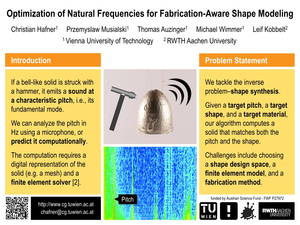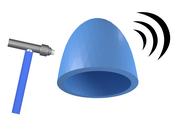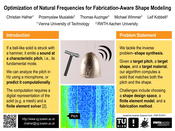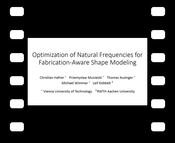Information
- Publication Type: Poster
- Workgroup(s)/Project(s):
- Date: August 2015
- Publisher: ACM
- Note: Lecturer: P. Musialski
- Location: Los Angeles, CA, USA
- Event: ACM SIGGRAPH 2015
- Booktitle: Proceedings of ACM SIGGRAPH 2015 Posters
- Conference date: 9. August 2015 – 13. August 2015
- Keywords: natural frequencies, modal analysis, shape optimization
Abstract
Given a target shape and a target frequency, we automatically synthesize a shape that exhibits this frequency as part of its natural spectrum, while resembling the target shape as closely as possible. We employ finite element modal analysis with thin-shell elements to accurately predict the acoustic behavior of 3d solids. Our optimization pipeline uses an input surface and automatically calculates an inner offset surface to describe a volumetric solid. The solid exhibits a sound with the desired pitch if fabricated from the targeted material. In order to validate our framework, we optimize the shape of a tin bell to exhibit a sound at 1760 Hz. We fabricate the bell by casting it from a mold and measure the frequency peaks in its natural ringing sound. The measured pitch agrees with our simulation to an accuracy of 2.5%. In contrast to previous method, we only use reference material parameters and require no manual tuning.Additional Files and Images
Additional images and videos
Additional files
Weblinks
No further information available.BibTeX
@misc{hafner-2015-onff,
title = "Optimization of Natural Frequencies for Fabrication-Aware
Shape Modeling",
author = "Christian Hafner and Przemyslaw Musialski and Thomas
Auzinger and Michael Wimmer and Leif Kobbelt",
year = "2015",
abstract = "Given a target shape and a target frequency, we
automatically synthesize a shape that exhibits this
frequency as part of its natural spectrum, while resembling
the target shape as closely as possible. We employ finite
element modal analysis with thin-shell elements to
accurately predict the acoustic behavior of 3d solids. Our
optimization pipeline uses an input surface and
automatically calculates an inner offset surface to describe
a volumetric solid. The solid exhibits a sound with the
desired pitch if fabricated from the targeted material. In
order to validate our framework, we optimize the shape of a
tin bell to exhibit a sound at 1760 Hz. We fabricate the
bell by casting it from a mold and measure the frequency
peaks in its natural ringing sound. The measured pitch
agrees with our simulation to an accuracy of 2.5%. In
contrast to previous method, we only use reference material
parameters and require no manual tuning.",
month = aug,
publisher = "ACM",
note = "Lecturer: P. Musialski",
location = "Los Angeles, CA, USA",
event = "ACM SIGGRAPH 2015",
booktitle = "Proceedings of ACM SIGGRAPH 2015 Posters",
Conference date = "Poster presented at ACM SIGGRAPH 2015
(2015-08-09--2015-08-13)",
keywords = "natural frequencies, modal analysis, shape optimization",
URL = "https://www.cg.tuwien.ac.at/research/publications/2015/hafner-2015-onff/",
}


 abstract
abstract eposter
eposter thumbnail
thumbnail video
video



